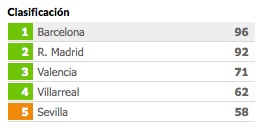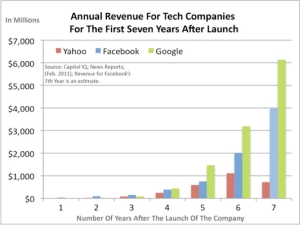A couple of weeks ago, we had the pleasure of visiting the headquarters of Intereconomia, a medium sized Spanish media group, located in the heart of Madrid's Paseo de la Castellana. It was really interesting to be able to learn more about a company that in only 10 years grew from being a niche radio station to become a media group with relevant voice and notoriety, and companies on the 4 segments of communication (TV, Radio, Print and Internet). I guess this is a sign of the modern times where media groups have to converge in order to survive.
Today, Intereconomia has 2 TV channels, 3 radio stations, 3 magazines, one newspaper and a variety of websites. These products together give them enough scale economies to survive in a market whose income has been hardly hit by the new technologies. After the internet revolution, media companies were forced to rethink the business model, since a lot of the advertising expenses that were used in old media were transfered to online. The issue is that it would not be by simply replicating the old media business model to the online world, as the competition is much tougher now, since the barriers of entry to become a communicator have disappeared, and online advertising expenditure is much more spread out. With this in mind, media groups had to grow not only to reduce theyre cost structures, but also to be able to offer medias that converge at a certain point.
Intereconomia is a great example of this modern conversion since they take advantage of the material recorded for their Business TV and use it simultaneously at Intereconomia Radio and on the web portals. This convergence is a win-win situation since while the company offers 3 medias for the price of one, the audience has more ways of engaging with the network. This engagement also creates a new source of revenue to the media group, beyond advertising: the experience economy. If you want to watch an Intereconomia show being recorded live, you can easily though so while enjoying a delicious paella at El Plató, a restaurant inside the building that has a panoramic view to the studio. Also, Intereconomia leverages its relevant brand in the business world by offering very expensive conferences for business professionals, who besides learning on whatever subject is that day, also get to network with peers from the industry.
We are currently living a "forced revolution" as traditional media as we knew it does not exist anymore. Everything now is about convergence. It is hard to see that independent company on any kind of media today. They have been eaten up by the emerging conglomerates who try to cover the audience's attention wherever they are. One good example on this attempt to cover attention comes from the "three screen theory" and ESPN is a company who have been investing heavily on it. They say that a good percentage of viewers usually also have the computer with them. Instead of having to rival with the internet for the viewers attention, ESPN offers possibilities for the audience to interact, and hence look at ESPN advertisers no matter where they are. With the popularization of smart-phones, the third screen came into place allowing the user to have ESPN with them wherever they go! Intereconomia has also been taking advantage of the new medias, they also have been present in the three screens with live broadcasting, allowing greater user engagement through Facebook interactivity. This model will be the future of the TV stations, and makes a special sense for intereconomia since the kind of content they provide has a very short life value. Theyre target audience is well educated and fully integrated to the digital world. If they don't offer this content at every possible place, someone else might steal the audience.
The process of content creation has also changed a lot. Due to cost reductions, news staff had to suffer heavy cuts, especially for journalists abroad. This posed as a great opportunity for news agencies, which now, more than ever provide the raw content to the newspapers around the globe. The only problem with this new model is that now, the newspapers are providing very similar contents, and it seems like the "breaking news" is not as exclusive anymore. There is though, one interesting trend on the "breaking news" bit: user generated content have been breaking the news faster than news agencies. An interesting case was on the recent Bin Laden killing, where a Pakistani was tweeting everything that was happening around his house, even though he did not know what was going on. Needless to say, he became an instant celebrity and was hired by news agencies to report on what was happening the following days.
Modern communications also offered a great change in the provision of content. While in the traditional media, the medium had all the power, today we see user generated content as an equally relevant form of communication. It is common to see youtube "channels" made by "aumateurs" who have hundreds of thousands, if not millions of viewers. Blogs have also become an important form of communication, and the acquisition of the Huffington Post by AOL at a $315m price tag is a proof of that. In the end of the day, these new forms of communication fight for the same advertising dollars, though with a much smaller cost structure.
Modern media companies must understand the new environment they are at in order to compete accordingly. The key is to leverage on they're best capabilities, which is usually related to the brand and credibility. Anyone can talk about economy, but an opinion emitted at the Financial Times will have much more relevance than that of any business blog, given the credibility the FT earned throughout its years of history.










